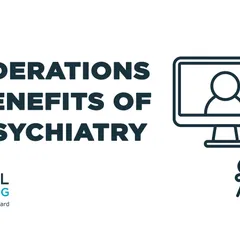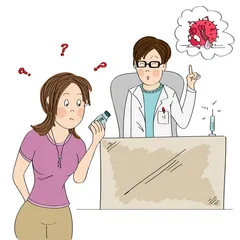Posts Tagged "Patient Care"
View all postsBenefits and Important Considerations of Telepsychiatry
By Amber Grob, PMHNP - January 16, 2024
While convenient, telehealth has its limits in patient care. Telepsychiatry, however, is an accessible approach to mental healthcare as it can be completed entirely virtually. Here are a few of the key considerations and benefits of telepsychiatry.
Physician Assistant vs. Nurse Practitioner: Explaining the Difference to Patients
By Jacob Bollinger, PA - June 1, 2022
Physician Assistants and Nurse Practitioners are two divergent career paths often mistaken for one another due to their similarities. In reality, they are more similar than different, which makes it even more difficult to understand the distinction between NP's and PA's. So this begs the question; what IS the difference?
Blockchain and Smart Devices are Creating Exciting Changes in Patient Care
By Mitchel Schwindt, MD - April 6, 2022
Blockchains, artificial intelligence, and wearable monitoring devices are already changing the face of healthcare. Remote patient monitoring is quickly being advanced and holds promise in improving the healthcare of countless patients.
Limitations and Pitfalls of Telemedicine
By Mitchel Schwindt, MD - May 4, 2021
The landscape of telemedicine is vast. New companies sprout often, and the structure varies widely. The following comments are based on the author's decade of providing startup advice to new companies and delivering consults on various telemedicine platforms for companies spread across the country.
How to Respond to Patients Who Decline Recommended Treatment
By Tammy McKinney, RN - January 29, 2021
As a Hospice nurse, one of the most common questions that I get is, “How do you deal with people who refuse treatments that can cure them?” Ethically, we know that patients have rights to make their own choices, but we end up in a dilemma when it goes against our instincts. Our fears kick in and we scramble to find a way to convince or even force our patients to do what we see as the “right” thing. But is our "right" their "wrong?"
Nurses, Lack of PPE, and Covid-19
By Tammy McKinney, RN - March 27, 2020
Look back in history, and you’ll surely find that during every tragedy, war, or disaster, nurses were on the front lines.
What Is A “Rock Star” Doctor?
By David Beran, DO - February 24, 2020
Many physicians possess some of these characteristics, but excellent physicians possess them all. Seamlessly integrating them into an excellent patient care experience is what makes you a rock star.
Important Aspects of Rural Telehealth Program Development
By Stacey E. Halford, MSW, LMSW - January 6, 2020
Core considerations for rural telehealth program development include: state telemedicine rules and regulations, language and terminology, state parity laws, staffing and teleconsultation models, funding, broadband access, and benefits to rural communities.
Providing Comfort While Avoiding Conversational Narcissism
By Tammy McKinney, RN - December 9, 2019
Death is an unavoidable. Whether you experience it at work or at home, you’ll need to be ready for how you’ll react. Practice. Memorize. Prepare yourself. When the time comes, you’ll be a great comfort to the family of your patient and know that you’ve done the right thing.
Five Ways Medical Culture Harms the Doctor-Patient Relationship
By David Beran, DO - November 4, 2019
Current medical culture has evolved over thousands of years. It dictates how we treat each other and ourselves. It's an insidious culture of self-neglect, unspoken hierarchies, jousting, and undervalued humanity. As physicians, we are expected to establish rapport and trust with our patients while enmeshed in medical culture. Our "values, norms, and practices" are to care for patients as we would our own family members. The success we're striving for is to have best possible outcome for all of our patients. But our goals and culture are antagonistic; good patient outcomes will occur despite medical culture, not because of it. The following are just five ways medical culture undermines the efforts to establish a successful doctor-patient relationship.









